Meat, vegetables, breakfast and even desserts…it’s a well-known fact that everything tastes better when cooked on a barbecue!
Barbecues come in every shape and size: there’s something for every taste and budget! Whether you have a full outdoor kitchen with a top-of-the-line barbecue or just a simple grill, all it takes are a few simple tips to take your BBQ prowess up a notch.
Here are 10 tips to help you become King or Queen of the ‘Q.
Temper meat
Experts agree: meat should be at room temperature before going on the grill. Remove meat from the fridge approximately 30 to 60 minutes before grilling. This promotes more even cooking and avoids meat that is well cooked on the outside, but still cold on the inside.
Preheat the barbecue
A hot barbecue means less food sticks to the grill. High heat also means that meat can be seared properly. How? Preheat the barbecue for 10 to 20 minutes (depending on the barbecue), at full power, with the lid closed.
Clean the grill
It is important that your grates are clean, as much for your health as for your safety. Once the barbecue is sufficiently hot, brush the grates vigorously to remove any fat or food residues. A solid brushing at the end of cooking can also help keep the grates in good condition and reduce risk of fire.
Plan your time
If your menu includes foods with different cooking times, you’ll have to plan your time carefully. Time on the grill varies considerably from one barbecue to the next and you’ll want to ensure that everyone can eat at the same time: start with the foods that need to be cooked the most, and continue with those that require less cooking.
Direct or indirect grilling?
We sometimes hesitate between direct heat (with the food directly over the fire) and indirect heat (heating one side of the barbecue, but cooking the food on the other). Direct grilling is best for cooking small items or those with more fragile flesh that cook fairly quickly. Indirect grilling, on the other hand, is ideal for larger or denser foods that would burn before being cooked if placed directly over the flames.
Open or closed lid?
As a rule, we recommend keeping the barbecue lid closed during cooking. This speeds up cooking (by retaining the heat inside) and reduces the risk of flames. That said, when cooking thin foods such as shrimp, for example, an open lid will do just fine.
P.S. Important: when you light your (gas) barbecue, the lid must always, always be open.
Prevent flare-ups
We all agree on one thing: when it comes to barbecuing, big flames are bad. If you were direct grilling, for example, the food would burn instead of cook.
To prevent large flare-ups, the first thing to do is to drain or pat food dry before placing it on the grill. Indirect grilling fatty foods, bacon being at the top of the list, will greatly reduce the risk of flare-ups.
Let the grill do its thing
Sticking, pressing and constantly turning meat during cooking are all bad options. But why? Prick the meat with a fork or press it to speed up cooking, and the juices that are essential for juicy, flavorful, tender meat are squeezed out.
To jumpstart the good old Maillard reaction (chemical reaction between amino acids and reducing sugars that gives browned food its distinctive flavour), place the meat on the hot grill and wait. The resulting roasted appearance locks in the flavours inside the meat. Ideally, you only turn the meat once during cooking, and when you do, you don't put it back in the same place. Just move it to the side, where the grill is still hot.
Follow cooking time
Cooking times are extremely important, especially when grilling. Timers and thermometers are your best friend when it comes to cooking the meat just right (nothing over or undercooked on this grill!). And remember, don't press on the meat to speed up cooking!
Let it rest
For meats that are as tender and tasty as can be, let them rest between cooking and serving. This rest time, estimated at around 20-30% of the cooking time, allows the juices and flavours spread evenly throughout the meat (rather than on the cutting board or plate). To keep the meat warm, tent it with aluminum foil (but not too tightly, as you don't want it to continue cooking).
Quebec producers offer a wide range of quality foods. Try grilling a type of meat or vegetable you’ve never grilled before; It's a delicious way to discover new flavours and eat local!
